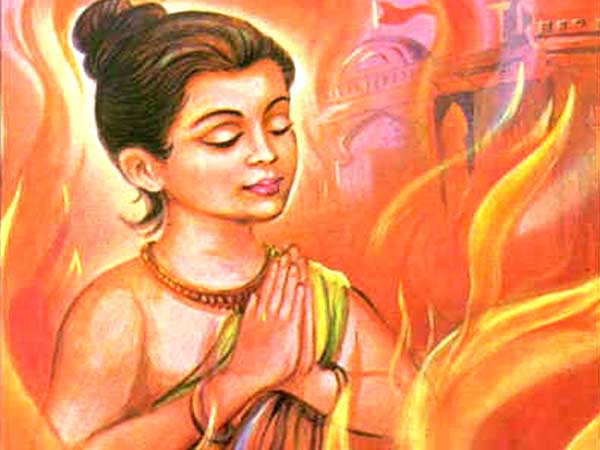By Upendra Mishra
Former FBI Director James Comey raises some interesting questions about President Donald Trump in his soon-to-be-released book: A Higher Loyalty: Truth, Lies, and Leadership. He calls President Trump cruel, selfish, liar, ego-centric, mob boss, “unethical” and “untethered to truth.”
While reading the excerpts from this book, I came across a paragraph on President Trump and “humility” that was published in Politico.
“As I’d seen from other leaders, being confident enough to be humble — comfortable in your own skin — is at the heart of effective leadership. That humility makes a whole lot of things possible, none more important than a single, humble question: ‘What am I missing?’ Good leaders constantly worry about their limited ability to see,” Comey writes in his explosive book.

As I was reading the above paragraph, an Indian mythological story about humbleness, leadership, truth, power, wealth and Indra and Prahalad flashed back in my head. Before I get back to the story from the great Indian epic Mahabharata, the first question is: what is humility or humbleness? There are three components of being humble: (1) honesty, (2) kindness, and (3) treating everyone equally. Nothing more, nothing less.
After the 18-day Mahabharata battle is over and Bhisma is waiting to die, he gives a series of lectures to the future king Yudhishthira about how to be a good king, a good person, gain wealth, use power and other lessons about day-to-day life. Yudhishthira also has many questions for Bhisma. One day, Yudhishthira prefaces his question by saying that people in this world praise humility (sheel) more than the righteousness (dharma).
Youdhistra: Please tell me what are the qualities of humbleness (sheel)? How can one get it?
Bhisma says that when one is equipped with humility or someone is humble, he or she can conquer the entire universe. “There is nothing impossible in this world for humble people,” Bhisma quotes from a story, and later to make his point he narrates the story of Indra and the demon king Prahalad, who with his power of humility had deposed Indra as king of gods and had conquered the three worlds.
After learning about the power of humility, Indra one day goes to Brihaspati, the guru of Gods, and asks him how to get his glory and kingdom back. Brihaspati sends him to Shukracharya, the guru of demons, to learn the lesson.
Shukracharya then sends Indra to Prahalad and instructs him to learn it directly from Prahalad himself. Being a humble person, Prahalad accepts Indra (who has disguised himself as a Brahmin) as his disciple and teaches him the art of being humble. In fact, Prahalad is so impressed by Indra’s devotion that he requests him to ask for a boon.
Indra gladly accepts the offer and says: “Grandsire, if you are happy and want to do good for me, I want your humility (sheel). Give me this boon.”
Prahland now has no option but to give his sheel to Indra. Indra happily goes away with the gift of sheel. After Indra has left, Prahland is sitting and thinking about what had just happened. Then, he sees a light emerging from his body that assumes the form of a human-like being.
Prahalad asks: “Who are you?”
The image answers: “I am sheel (humbleness). You have given me up, and now I am leaving you.”
After few minutes, another image emerges from Prahalad’s body. He asks: Who are you?” The image says: “I am the righteousness (dharma). Where sheel lives, I too, reside there.”
After dharma leaves, a third image emerges. Prahalad asks: “Who are you?” The Image answers: “I am truth and I am following the righteousness.” After the righteousness leaves, a strong body appears. Prahalad asks: “Who are you?” The body replies: “I am sadachar (virtue, good behavior, moral). Where truth is, I also live there.” Another image emerges. Prahalad asks: “Who are you?” The image says: “I am ball (strength, power) and where sadachar is going I am also going there.”
Towards the end, a beautiful lady emerges from Prahalad’s body. He asks: “Who are you?” She says: “I am Lakshmi (Goddess of Wealth). You have given me up, and I am going away from here because where strength lives I reside there.”

She adds: “Righteousness (dharma), truth (satya), good behavior (sadachar), power (ball), and I (Lakshmi)—we all reside on the foundation of humility. Sheel (humbleness) is the root of everything.”
We have started to notice now that despite being the president of the most powerful country, and sitting in probably the most powerful seat in world, President Trumps seems to be so powerless: FBI is after him and he cannot do anything; media has been attacking him from all sides; most of his advisers have left him; and there are so many questions about his true wealth as well after his so many bankruptcies. Why?
President Trumps seems to be far away from being humble as described by Comey in his book: cruel, selfish, liar, ego-centric, mob boss, “unethical” and “untethered to truth.” He lacks compassion for hardworking and poor people, including immigrants; and he does not treat people equally as his core value.
In the Shanti Parva and Anushashan Parva of Mahabharata, Bhishma teaches numerous day-to-day lessons. Here are a few lessons on leadership:
- Recognize friends and enemies.
- Observe virtues without wrath and malice, and never abandon kindness.
- Accumulate wealth without cruelty and pursue pleasure without attachments.
- Avoid the wicked, and never act with hostility towards friends.
- Speak of others’ merits but not your own.
- Don’t employ people with negative qualities.
- Do not cherish malice and be pure in thoughts, words and deeds.
- Serve others with humility.
- Comfort people with proper action and not empty words.
- Do not abandon anyone who has supported you.
- Display temper only when it is necessary and be mild but not to those who have offended.
(Mr. Mishra is managing partner of the Waltham, MA-based integrated inbound marketing and PR firm The Mishra Group. He writes about his three passions: marketing, scriptures and gardening.)













